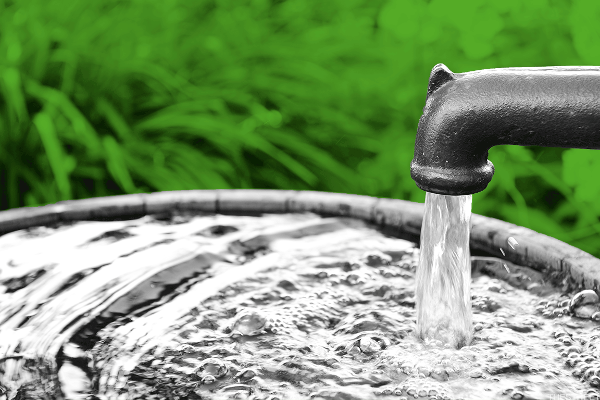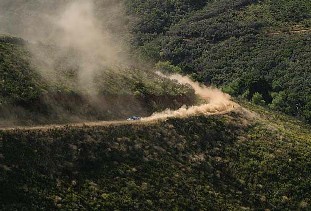Page added on May 29, 2018
The Next Big Crisis: Drinking Water

You might be looking at the next global crisis right now.
Because as easily as most people get a clean drink out of the tap, billions of people can’t take that for granted. This problem is only going to get worse.
For decades water access has been a slow-growing crisis as many parts of the world struggle to secure clean, reliable supplies. Today, out of the world’s 500 largest cities, approximately one-in-four can’t always meet their own needs. In 20 years, according to United Nations estimates, global demand will exceed the supply by 40%.
Twenty years from then at least a quarter of the world’s population will live with chronic or recurring shortages.
Yet where residents of California may live this as a fight over who gets a green lawn, in poor and developing regions this can define an entire way of life.
“Water access is about freedom to be fully human,” said Pierre Ferrari, President and CEO of Heifer International. “It’s impacts are staggering for farmers in our programs. Water is fundamental to their economic stability, as they depend on it for irrigation, livestock watering and feeding. But the psychological impact of not having clean water is also immense — we see anxiety, fear and depression in communities that lack access.”
“In our work in arid areas, the daily search and transportation of water for drinking, hygiene and cooking is constant and overwhelming. It is a main use of energy by all, but mostly a task that falls to women and girls. Making clean water easily accessible may be the single most important intervention to give women and girls the freedom to escape poverty and oppression. All these can be lifted as water becomes available.”
Water is definitional. Health, safety, food, it all starts with access to a clean supply, and communities will redefine their entire identity around finding and securing that access. As Ferrari notes, everyone and everything is influenced when that supply is disrupted.
Perhaps the most critical loss of all is time. For people who can ill-afford more uncertainty and disruption to an already-fragile standard of living, getting water can demand hours of time that they simply can’t spare.
In developing communities across Africa and South Asia, usually it’s women who average a half an hour getting each and every bucket of water. Worldwide, women and girls alone spend more than 200 million collective hours per year on this one task. That’s hundreds of millions of hours not spent in school, not developing their community and not spent building businesses. A particular loss, considering that in the developing world women-led businesses tend to outperform those run by men.
Illness and chores related to water keep children home from school, often disrupting educators’ ability to form those schools altogether as class attendance may fluctuate unsustainably. Without access to water sanitation suffers, as communities can’t spare this scarce resource on waste. As a result, tonight more people around the world will use a cell phone than a toilet.
Agriculture is disrupted. Farmers, unable to effectively water their crops, produce less and rely more on synthetic fertilizers which, in turn, further contaminate already precious supplies. Communities, struggling from not having enough to drink, have their problems compounded by food scarcity.
Water shortages are chronic, crippling, and getting worse.
While many Americans see this as a problem for the developing world, one which can be solved by better plumbing and personal hygiene, the reality is that communities across the United States already suffer from fetid and unclean sources. Flint, Michigan achieved notoriety for the leaded tap water that poisoned a city, but rural communities have dealt with similar problems for generations. Water runs cloudy or reeking of chemicals, or filled with detritus, or, from time to time, on fire.
As population growth increases demand and global warming reduces available resources, this problem will only get worse. Years-long droughts have ravaged east and south Africa. Corn production in Zambia (an essential food source for the country) will fall by half this year and the nation’s critical hydroelectric infrastructure has all but sputtered out in the wake of declining river levels. Cape Town has watched its largest reservoir slowly dry up with “Day Zero,” the day the city will simply run out of water, approaching in 2019.
The World Bank estimates that a city needs about 1,000 cubic meters of fresh water per person per year to maintain adequate supplies. By 2014, Beijing had 145. In 2015, Sao Paulo had less than three weeks of water left before having to turn off access for the entire city. Only a sudden rainstorm spared the city from running out altogether.
Los Angeles famously dumped nearly 100 million “shade balls” into its Ivanhoe Reservoir to try and protect what it had left; the balls should help reduce evaporation and deter algal growth.
Water supplies are getting more scarce. When they run out, it’s the poor who suffer. In the developing world, poor communities have to dedicate endless hours to hauling one bucket at a time from far off supplies. In cities, they typically have to suffer whatever comes out of the tap, while wealthier neighbors can afford to buy increasingly expensive bottled water.
While everyone complains if showers slow down and the lawns used to be greener, no one with money goes thirsty or has to skip school. No one with money gets sick because the buckets they use can contaminate even clean supplies, and no one with money would continue to use poisonous infrastructure.
As life’s little luxuries get more expensive, only the poor have to watch them slip away altogether. Someone with money may grumble about how a cup of coffee once would cost 50 cents less. Someone without will remember how much they once enjoyed having their morning coffee in all.
Water has received some coverage in recent years. My colleague Anna Clark has written an elegant and powerful book on the subject of Flint, and Water.org’s founder Matt Damon has made it a personal mission. Expect many more such works in the future because, without sweeping changes in consumption and environmentalism, this is just the beginning.
13 Comments on "The Next Big Crisis: Drinking Water"


dave thompson on Wed, 30th May 2018 12:12 am
Is this really news? Water problems abound around the world. We humans have an old expression; what you gonna do when the well runs dry?
Kat C on Wed, 30th May 2018 3:56 am
Without food you can go maybe 3 weeks, without water 1 week.
Then there is the question of “is the water safe to drink”. For many it is not. That will only get worse
Davy on Wed, 30th May 2018 5:57 am
“How Climate Change Contributed to Ellicott City’s Back-to-Back Historic Flood Events”
https://tinyurl.com/ycnrx9k8
“Back when climates were more stable during the 20th Century, we would have expected Ellicott City to see the type of severe rainfall that occurred during 2016 to happen once every thousand years or so. But with the present global climate amped up by human forced warming, just two years elapsed before another such ‘1 in 1,000’ year event hammered the region yet again.”
https://tinyurl.com/yauvertm
“The Earth is warming up. Atmospheric moisture levels are rising. Severe rainfall events are proliferating across the world. And off the U.S. east coast, the Gulf Stream is slowing down as Greenland disgorges more of its ice.”
“Climate change increases the ability of the strongest storms to generate more intense downpours by loading up the atmosphere with moisture and by increasing instability in certain regions. The Eastern U.S. is particularly prone to increasing rainfall intensity due to a warming Gulf of Mexico, a warming North Atlantic off the U.S. East Coast and due to an instability-generating cool pool off Greenland fed by glacial melt water.”
Simon on Wed, 30th May 2018 6:03 am
I have always wondered why we don’t teach simple brewing techniques, that is how our ancestors ‘cleaned’ organic contaminants from dirty water. My old school used to serve ‘small beer’ to the kids (admittedly long ago)
Manila1 on Wed, 30th May 2018 6:43 am
Why doesn’t the article mention the Us’ drinking water problems? They like to point out the 3rd world’s problems and ignore those at home.
“Millions of Americans exposed to unsafe drinking water … – USA Today”
“63 million Americans exposed to unsafe drinking water – USA Today”
“Millions of Americans drink potentially unsafe tap water. How does …”
“America’s Tap Water: Too Much Contamination, Not Enough …”
“Rural America’s Drinking-Water Crisis | The New Republic”
“Tap Water in 42 States Contaminated by Chemicals – ThoughtCo”
https://www.google.com/search?q=poluted+drinking+water+in+the+US%3F&ie=utf-8&oe=utf-8&client=firefox-b-1
“Water, water everywhere and not a drop to drink! “3rd world America in the making.
Simon on Wed, 30th May 2018 6:55 am
A new winner 5 posts … and were back.
Come on lads I am waiting for 4 posts
Davy on Wed, 30th May 2018 7:07 am
3rd world, if I used USATODAY.fakenews.com as a source you would have a hissy fit. Also the proper way to reference articles is with a link.
MASTERMIND on Wed, 30th May 2018 7:58 am
Trump’s wife hasn’t been seen in 19 days..I bet Trump beat her and she has bruises on her face..
Manila1 on Wed, 30th May 2018 8:00 am
What, Davy? You don’t like American propaganda as a source? Although, this time, they are reporting fact, not fiction. Very little, if any, Us water is not polluted.
“Drugs in Our Drinking Water? – WebMD”
https://www.webmd.com/a-to-z-guides/features/drugs-in-our-drinking-water
“Drugs in the Drinking Water? Don’t Ask and Officials Won’t Tell’
https://www.organicconsumers.org/essays/drugs-drinking-water-dont-ask-and-officials-wont-tell
“From ‘Sea to Shining Sea,’ Industrial Ag Fouls America’s Waterways”
https://www.ecowatch.com/industrial-agriculture-water-pollution-2551396477.html
“Farm Runoff Causing Widespread Drinking Water Pollution in Midwest”
https://www.ewg.org/release/farm-runoff-causing-widespread-drinking-water-pollution-midwest
The list of America’s water pollution facts are endless.
MASTERMIND on Wed, 30th May 2018 8:39 am
Flip This Well: How Fracking Company CEOs Get Rich While Losing Billions
https://www.desmogblog.com/2018/05/29/flip-well-fracking-shale-halcon-resources-floyd-wilson
Davy on Wed, 30th May 2018 9:31 am
‘What, Davy? You don’t like American propaganda as a source?”
3rd world just asking you to live by what you preach. I appraciate you showing your links. Good boy.
“Very little, if any, Us water is not polluted.”
“If any” is pretty extremist language 3rd world.
US water in most areas is better than most Asian sources. Probably equal to many European sources. Mine around where I live is excellent and plenty of it.
fmr-paultard on Wed, 30th May 2018 10:41 am
both forms of extremism is bad. SENTAPBs is political and want to seize powa to control women and darkies. The solution or part of is women in combat and law enforcement. it drives them against the wall so they’re forced to dwell in basement forever.
with islam we have a more complete system of soft and hard warfare against liberty. the solution also is women in combat. they will be going against people with simple weapons because they put less emphasis on technology and more on faith. killing is easy and it’s time women get into the action so they can have a larger share of the pie
Manila1 on Wed, 30th May 2018 8:12 pm
Davy, again, you are talking out of your ass. Tell me what personal experience you have had with Asian water? Speak louder! None, you say? Then how do you KNOW it is worse? I can tell you from personal experience that it is not what the Us MSM propaganda machine claims it to be. Prove me wrong.